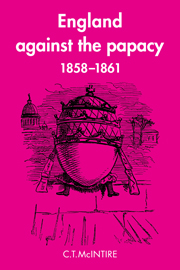 England Against the Papacy 1858–1861
England Against the Papacy 1858–1861 Book contents
- Frontmatter
- Contents
- Acknowledgments
- A note on the footnotes and abbreviations
- Maps
- Introduction
- 1 ‘English Liberties’ and ‘The Government of Priests’
- 2 Odo Russell and the network of English–papal relations
- 3 Tories, the pope, and peace
- 4 Tories, the pope, and war
- 5 Liberals and the revolution in the Romagna
- 6 Liberals, the congress and the Romagna
- 7 Liberals and the annexation of the Romagna
- 8 Liberals and the annexation of the Marches and Umbria
- Conclusion
- Select Bibliography
- Index
4 - Tories, the pope, and war
Published online by Cambridge University Press: 07 October 2011
- Frontmatter
- Contents
- Acknowledgments
- A note on the footnotes and abbreviations
- Maps
- Introduction
- 1 ‘English Liberties’ and ‘The Government of Priests’
- 2 Odo Russell and the network of English–papal relations
- 3 Tories, the pope, and peace
- 4 Tories, the pope, and war
- 5 Liberals and the revolution in the Romagna
- 6 Liberals, the congress and the Romagna
- 7 Liberals and the annexation of the Romagna
- 8 Liberals and the annexation of the Marches and Umbria
- Conclusion
- Select Bibliography
- Index
Summary
The Cowley mission and the pope
When Benjamin Disraeli announced on 25 February that the pope would soon request the withdrawal of the French and Austrian troops from the States of the Church, he made a second announcement which equally gratified Parliament. The English government, he said, had decided to send Lord Cowley to Vienna on a special mission of peace, and at that moment, in fact, the English ambassador was en route to the Austrian capital. Cowley arrived on 27 February and remained until 10 March, during which time he held extensive talks with Emperor Francis Joseph, Count Buol, and many other persons. The papacy figured as a major issue in the discussions.
The mission could not have been more timely from the standpoint of the Papal Question, although neither the papacy nor the English government knew just how timely it was. While Cowley was in Vienna, the pope and Antonelli were preparing the official request for the complete evacuation of the two armies; the document was finally issued on 11 March. At the same time, unknown to the papal government, the Italian National Society intensified its conspiracy to overthrow papal temporal power in the Romagna, the very thing the troop occupations had been designed to protect the pope against. On 1 March the National Society sent secret instructions, signed by La Farina as secretary and Garibaldi as vice-president, to all its agents in central Italy.
- Type
- Chapter
- Information
- England Against the Papacy 1858–1861Tories, Liberals and the Overthrow of Papal Temporal Power during the Italian Risorgimento, pp. 88 - 113Publisher: Cambridge University PressPrint publication year: 1983


